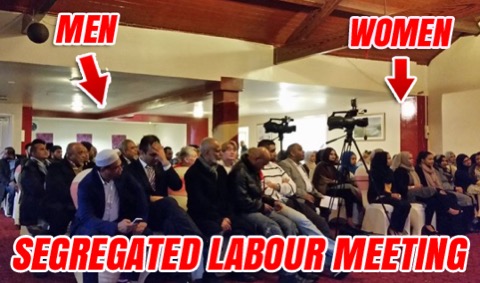ANALYSIS The Islamization of the British Labour Party
by - 11th November 2016

EXPLANATIONS for the disillusionment of working-class voters with the Labour Party are fashionable and numerous: the development of an increasingly post-industrial Britain since the 1980s; the abandonment of working-class concerns within the Labour Party under Blair; through to mass immigration post-1997 and an increasingly atomized society. There is a further explanation: that the left has embraced an Islam whose worldview is anathema to many working-class people in Britain, of any religion or none.
If this shift has a defining image, it is one of two pictures from Labour’s campaign in the 2015 Oldham West and Royton by-election. At the Labour Friends of Bangladesh event, men are placed on one side of the room, women segregated in the other. In the second image, no women are present at all, and the candidate, Jim McMahon, sits awkwardly, the only white person in a room full of Muslim elders.
In its embrace of organized British Muslims, the left has shown a tendency to abandon once-cherished values: the rejection of sexism or Jew hatred, or a disdain for religion, to take just three examples. The accusations of anti-Semitism which have dogged Corbyn’s leadership are the latest in a series of broader clashes around accommodating secular and Islamic values which other parts of the left and indeed many constituency Labour parties settled in favour of the Islamists years ago.
For this analysis, ‘the left’ is taken to include the Labour party, trades unions, left-orientated academics and political parties to the left of Labour. Islamism is taken to mean an ideological view of Islam which seeks to establish norms of Muslim conduct in the affairs of British society.
It was the well-meaning policies of left-wing local authorities in the 1980s that created the space for a relationship to grow between the left and British Islamists with their roots in the Middle East or Indian sub-continent. Secular Muslim commentator Kenan Malik has argued that municipal multi-culturalism meant designating communities according to ethnicity, and engaging with them or more accurately their ‘community leaders’ on that basis. The law further reinforced identity politics based on territory and religion, following the Mandla v Dowell-Lee case in 1983, which Anthony Bradney in his important Religions, Rights and Laws studied in depth. This provided fertile soil for minority religious organisations seeking to obtain then hold influence and standing. The gradualist nature of Islam, its historical experience of exile and minority status, favourable demographics, plus an overlapping global Islamic resurgence, afforded the means necessary for Islam’s rapid development in Britain as other faiths declined.
This presented some challenges for a left that was broadly secular, and at times openly hostile to organized religion. The 1989 controversy over Salman Rushdie’s Satanic Verses was to be the first test of the left’s values, a test that the shameless Keith Vaz MP failed outright, at one point telephoning Rushdie to offer support against the fatwa, the next standing alongside Muslim constituents as they held placards calling (literally) for Rushdie’s head.
Secularism
Asserting the primacy of principles such as freedom of expression or secularism was shown to be too costly for the left. It was expensive in terms of potential votes. And it proved impossible for them in a multi-cultural society to reject the views of organized groups from within an ethnic minority community.
It was costly also in terms of the sheer effort required to challenge Islamic activists. How do you debate someone who thinks death is acceptable for anyone who writes or says the wrong thing? The path of least resistance proved irresistible. As Malik points out, by the time of the Muhammad cartoons controversy in 2005-6, the voices that had spoken for Rushdie were silenced by a fear of causing offence.
Tiger
Chris Harman, Chairman of the Socialist Workers Party on the Trotskyist left published in 1994 his The Prophet and the Proletariat in which he warned SWP members against two previous errors in the left’s approach to Islamists. One was mistaking them for fascists; but secondly, in a nuance lost on many readers, mistaking them for progressives. He knew exactly the nature of the tiger he wanted the SWP to ride in its bid to destroy capitalist democracy.
Harman, ironically a Jewish atheist, also provided a crucial theoretical basis for what had by now become instinctive, which was to regard Western governments as worse than those of Islamists of virtually any stripe. Harman wrote unforgettably: ‘With the Islamists sometimes, with the state never’. And with that, he established a principle that has rarely been broken. Only occasionally has it been challenged, for example by Iranian Communist exiles who wanted to condemn Bush and Bin Laden, or the Council of Ex-Muslims in Britain (CEMB), articulating the harm Islamists do within their own communities. But as an organizing trope, the left never abandoned it. The Cold War Trotskyist standard of ‘Neither Washington nor Moscow but International Socialism’ was not to be followed, post 9/11, by the rallying slogan ‘Neither Washington nor Kandahar’.
Within a decade, ‘with the Islamists sometimes’ became, in practice, ‘with the Islamists rather often.’
Next time: Academia and the Muslim Brotherhood
 DR PAUL STOTT lectures in international security at the Centre for International Studies and Diplomacy at the School of Oriental and African Studies, London. His recently completed doctorate on British Jihadism: the Detail and the Denial will be published by Routledge in 2018.
DR PAUL STOTT lectures in international security at the Centre for International Studies and Diplomacy at the School of Oriental and African Studies, London. His recently completed doctorate on British Jihadism: the Detail and the Denial will be published by Routledge in 2018.
